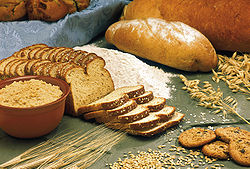- Chodosh
-
In Judaism, Chodosh (or Chadash) (Hebrew: חדש ; "new [grain]") is a concept within Kashrut (the Jewish dietary regulations), based on the Biblical requirement not to eat any grain of the new year (or products made from it) prior to the annual Omer offering on the 16th day of Nisan.[1]
Grain products which are no longer affected by this law are referred to as Yoshon (= old).
Contents
The five types of grain
In Rabbinic Judaism, this requirement is restricted to the five classical grains of Judaism - Wheat, Barley, Oat, Spelt, and Rye; any of these grains (or products made from them) that are too "young" to pass the requirement are referred to in Judaism as Chadash ("new [grain]"). Additionally, the Rabbinic interpretation requires grain to have taken root prior to the Omer offering for it to become permitted; therefore, grains planted after Passover could only be consumed -at earliest- twelve months later.
Following the destruction of the Temple in Jerusalem, the Omer offering is no longer offered. Hence, Chazal enacted that the new grain becomes permissible following the date on which the offering was brought in ancient times.
Outside of the Land of Israel
The applicability of the Chadash rules to grain grown outside the Land of Israel is a subject of debate among halakhic authorities. The majority of medieval Jewish scholars (e.g. Moses Maimonides, the Rif, and the Rosh) forbade its consumption. The later codifiers of Jewish law for Ashkenazic and Sephardic Jewry followed suit, both Rabbi Moses Isserles and Rabbi Joseph Caro declaring the stringent position. A radically novel lenient approach was presented by Rabbi Yoel Sirkis who felt it is permissible if the grain originally belonged to a non-Jew.[2] Additionally, the manner in which various foods have historically been available has meant that Jewish populations would need to risk starvation to pursue stringent compliance with this aspect of kashrut. These two factors led to a situation in which observation of the Yashan regulation was relatively limited until very recently (at least in the Ashkenazic community).
In Chabad literature
Rabbi Schneur Zalman of Liadi -the author of Tanya and Shulchan Aruch HaRav- quotes the basic opinion of Chadash being forbidden Midioraita[3] and after considering the leniency of Rabbi Yoel Sirkis writes that -even for wheat harvested from a non-Jewish field- a "Baal Nefesh" (lit. an "owner of soul") should be scrupulous and not rely on lenient Rabbinic opinions[4]. Similarly, In a responsa of Rabbi Schneur Zalman, he notes that in generations prior to his the custom was to take the lenient approach (i.e. rely on Rabbi Sirkes's leniency) but in his generation many have assumed the stringency of not consuming Chadash[5].
Rabbi Schneur Zalman's son, the Mitteler Rebbe explains in a Maamor the important aspect of the Kohen bringing the Omer offering on the Mizbeach (from Barley -usually used as Feed) and only then is the consumption of Wheat (usually reserved for Human consumption) permitted[6].
From the writing of his followers, it has recently been published that Rabbi Sholom Dovber Schneersohn -the Fifth Chabad Rebbe- was scrupulous in refraining from Chadash products when he attended a Siyyum of Yeshivah Students[7].
Chodosh today
In modern times, particularly in Developed Nations, food is much more readily available than it historically had been, and grain is in sufficient abundance that many Orthodox Jews have become more interested in observing chodosh restrictions. Modern packaging practices, which in some nations involve the stamping of production dates on every package, often allow individuals to determine whether food is definitely yashan (not "chodosh"); packaging organisations sometimes add Kashrut information to the packaging, and sometimes include in this information whether the product is known to be yashan.
References
- Joseph Herman, A Guide To Chodosh
Footnotes
- ^ Leviticus 23:14
- ^ Shulchan Aruch, Yorei De'ah 293, Laws of Hadash, with commentaries.
- ^ Shulchan Aruch HaRav 489:29
- ^ shulchan aruch harav 489:30
- ^ Responsa (as addendum to) vol. 5 of Shulchan Aruch HaRav p. 506
- ^ Maamarei Admur HoEmtzoi Bamidbar vol. 2 p. 465
- ^ Reshimat HaRava"sh (Kehot 2001) p. 96
External links
Categories:- Jewish sacrificial law
- Kosher food
Wikimedia Foundation. 2010.

